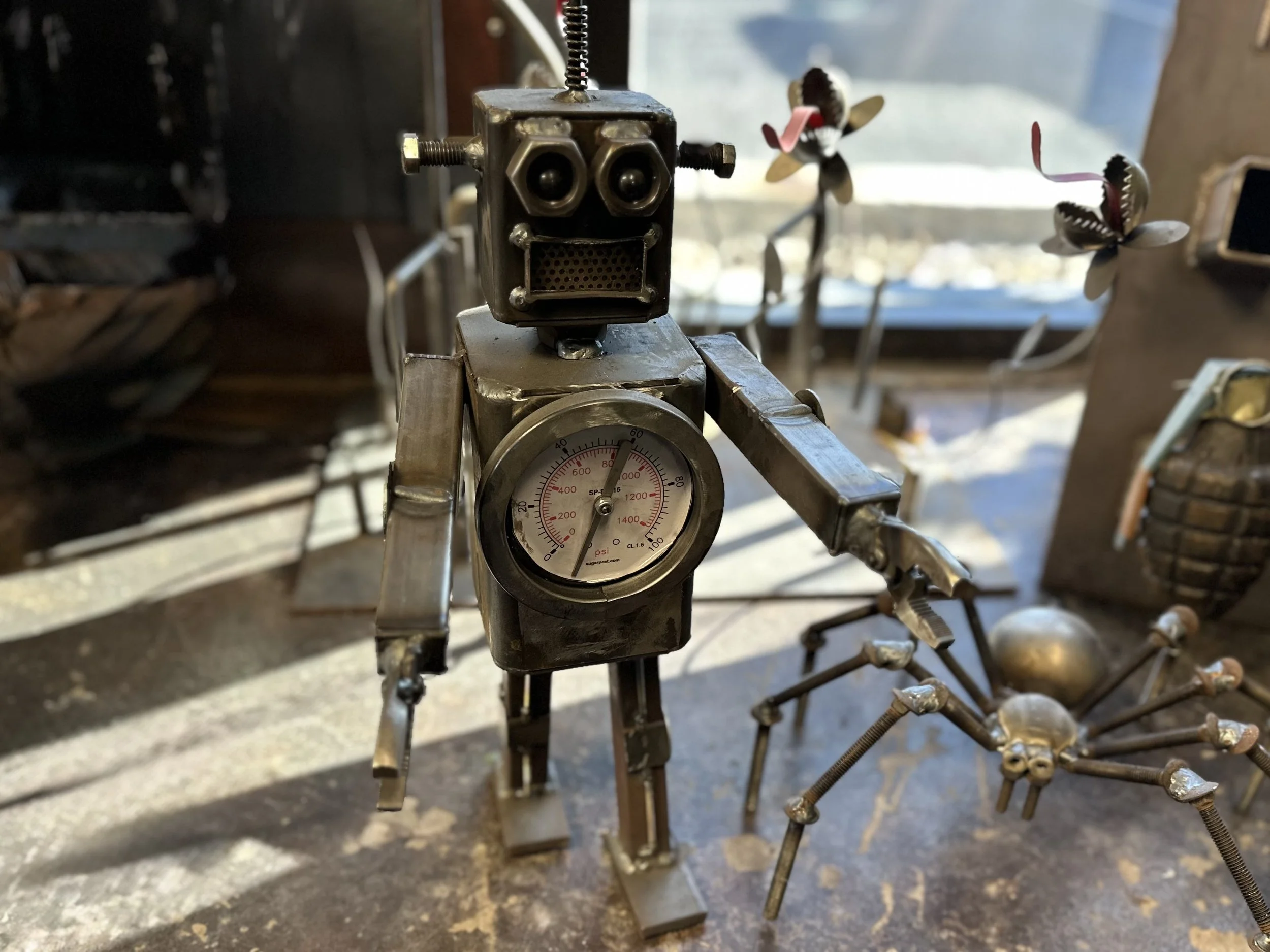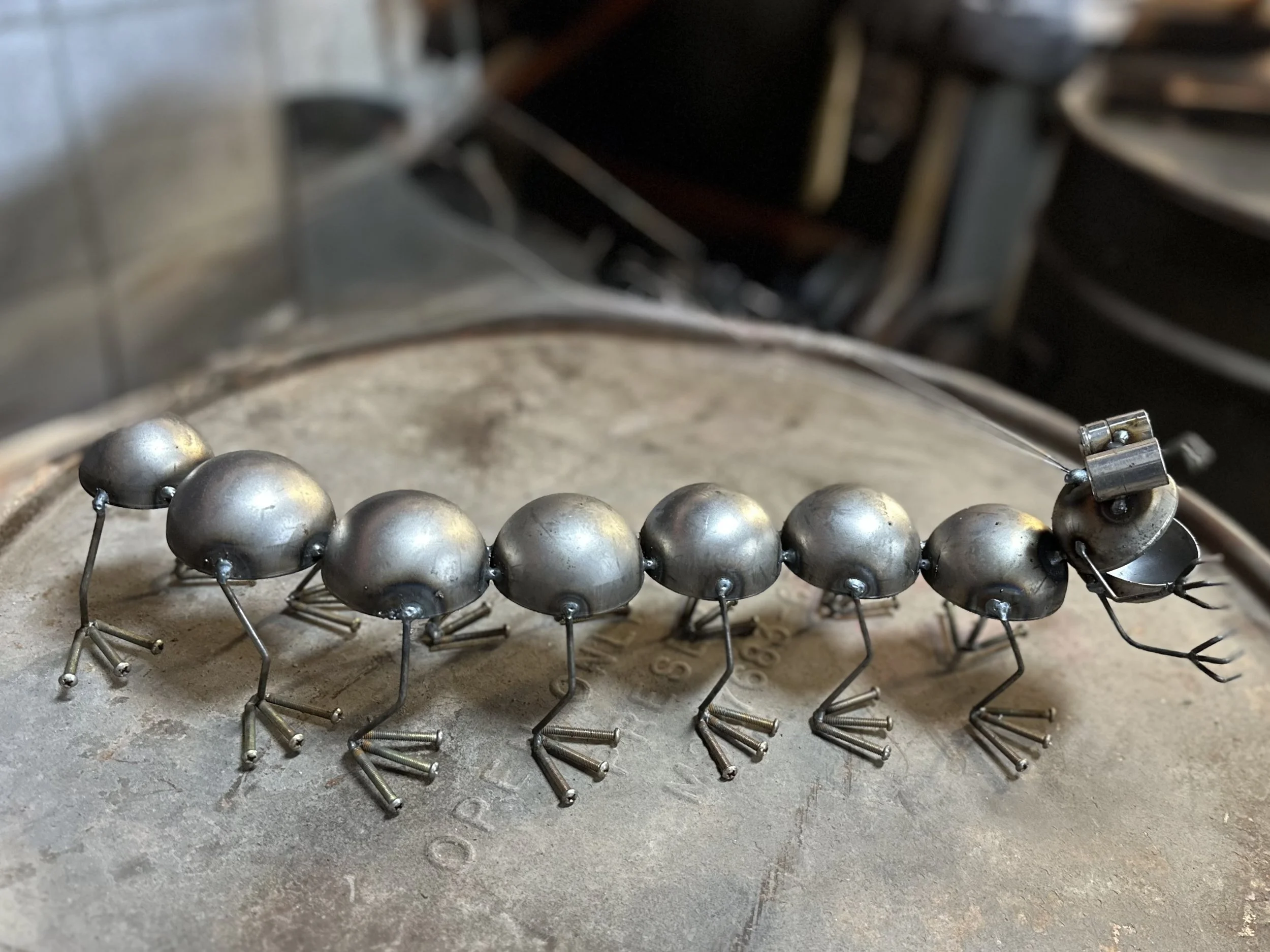Sugarpost
Address: 80 West Truman Avenue
Telephone: 801-832-9235
Website: sugarpost.com
District: South Salt Lake
“I hope that in some small way, I am keeping alive the memory of the men who wore those helmets during WWII - giving them a fun second run.” Fred Conlon, owner of Sugarpost, did not plan to be a welder. He did not even plan to be a potter. But he always had an openness to life’s unexpected turns and a deep appreciation for pursuing what felt right, even if it did not make perfect sense at the time.
Born in Steamboat Springs, Colorado, Fred grew up the only child of two English teachers. “They told me, go to college, get a degree, but take classes you’re interested in.” That simple encouragement led him to a small Division III liberal arts school in Iowa where he could play football - and where a single pottery class changed the course of his life. “I sort of fell in love with it,” he said. Every semester, he squeezed pottery into his schedule, eventually becoming the studio assistant. He dove headfirst into wheel-throwing, glaze calculations, and kiln building. It was the start of something much bigger.
After taking two years off, Fred transferred to the University of Utah - “close enough to home, but not too close” - and it was there he met his wife. The two graduated and married in 1997. Fred earned a degree in public communication but did not feel called to that path. When his wife asked, “Wasn’t it your dream to open a pottery shop?” he hesitated. “What if I can’t make a living doing that?” Her response was steady: “Then we try. If we fail, we have nothing to lose. We don’t have kids, we don’t have car payments, we don’t have a mortgage.” Her philosophy was simple: never live with the “what ifs.”
With $4,000 left to him by his grandmother, Fred bought eight pottery wheels, enough brick to build a kiln, some burners, and 2000 pounds of clay. The last $800 went toward the first month’s rent at a small space in Salt Lake City’s Sugar House neighborhood, right across the street from the post office. “So, the name Sugarpost kind of stuck,” he said.
Fred and his wife taught pottery classes seven nights a week. Within their first year, they found out they were expecting a child. “We were living off whatever we sold in the pottery shop and what we made from teaching classes.” For five years, from 1998 through 2003 Sugarpost was a community ceramics space. But then Fred found himself drawn in a new direction.
One day, he walked into an Army Navy surplus store and saw a pile of old WWII helmets. “I thought of my grandpa, who was at Pearl Harbor when the Japanese attacked. He always told me that war happens quickly. But peace, peace moves slowly.” To Fred, those helmets looked like turtle shells. And so, he made his first turtle out of an old Army helmet - an homage to the slow, steady pursuit of peace in a world too often defined by conflict. A customer saw it and declared it the cutest thing she had ever seen. “I said, ‘It’s not for sale.’ Then I said, ‘Okay, $20.’ And she bought it.”
That was the beginning of a new chapter. Pottery was slow - two to three weeks to make a mug that might sell for $15. But metal was different: durable, efficient, creative. Fred began making more turtles. Then ladybugs. Then ants. Then spiders. “I thought people put some pretty silly stuff in their yards - gnomes and flamingos. I wanted to make something cooler.” So, he created what he calls the Gnome-Be-Gones - little metal monsters who carry gnomes out of the yard. “They help control the gnome population,” he joked. “It’s garden art that doesn’t suck.”
Fred’s whimsical, rebellious sculptures found a loyal following. He began entering art shows - first in Chicago, then Philadelphia, then New York. Each time, the booth fees were higher. “I called my dad before that first big show and said, ‘I don’t know if we should go. I don’t think we’ll make enough.’” His dad’s response stuck with him forever: "If you don’t go, you already know the answer."
Chicago was a success. Philadelphia even more so. At the New York International Gift Fair, Fred sold more in five days than he had in the previous two years combined. That moment changed everything.
Fred opened his South Salt Lake City business in 2009. Today, he is enjoying running a successful metal art shop from his warehouse. He has created large-scale commissions for Under Armour, the University of Maryland, and installations in Park City and Daybreak. His full-size metal skeletons - some playing fire-shooting instruments - have ended up in private collections around the country. He has also expanded to structural welding and mobile projects, including railings and beams, especially during the pandemic when art shows came to a halt.
He and his wife have raised four children, and rather than leave them behind during his travels, they took them along for the ride. “It was hard,” Fred admitted. “But they learned how to hand out business cards, look people in the eye, answer questions, restock the booth. They grew up on the road and turned into some pretty neat humans.”
Today, their children are carving their own paths. One is a mother herself, another is in college, one is a nanny, and the youngest is finishing high school. “They’re artistic,” Fred said. “But they don’t want to live in our shadow. They’re making their own way. And that’s awesome.”
Still, Fred hopes to continue inspiring young people to follow their dreams - not the practical ones, but the real ones. “Plan A is what you think you should do. Plan B is your backup. But Plan C - Plan C is your dream. And when you’re young, that’s the time to try it. If you fail, so what? At least you won’t be haunted by the what ifs.”
Fred has found his place in South Salt Lake, grateful to be part of a growing artistic community. “When I first came here, these warehouses were empty. Now, there’s a real sense of community - small businesses employing local people, supporting each other, overlapping circles of influence. That’s where the culture comes from.”




































